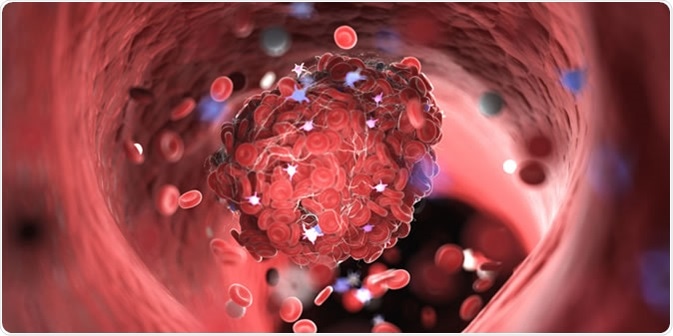Skip to:
- What is the oral contraceptive pill and how does it work?
- What are blood clots and what are the symptoms?
- Blood clots in women on contraceptive pill
- Does the contraceptive pill increase the risk of blood clots?

What is the oral contraceptive pill and how does it work?
Oral contraceptive pills, also known as birth control pills, are used by around 9% of women worldwide and 18% of women in developed countries.
The contraceptive pill is most often used to prevent pregnancy. However, it may also be prescribed for the management of hormonal imbalances leading to heavy or irregular periods or acne. the two forms of oral contraceptives are available, a combination estrogen and progestin pill and a progestin-only pill.
The combined pill prevents the ovaries from releasing eggs, thickens cervical mucus, and thins the uterine lining. Together, these effects make it unlikely that sperm will fertilize an egg. The progestin-only option also thins the uterine lining and thickens the cervical mucus but does not reliably prevent egg release.
Combined oral contraceptives can be 91% effective for prevention of pregnancy when used as instructed.
What are blood clots and what are the symptoms?
Blood clots are normal responses of a cut and helps to keep the bleeding under control. However, blood clots can occur internally, especially in leg veins, known as deep vein thrombosis. If a clotting of blood occurs, the veins in the leg can get blocked causing this condition.

Overweight or obesity, smoking, immobility, certain inherited conditions, and use of hormonal contraception increase the risk of blood clots.
The symptoms of a blood clot include swelling, pain and tenderness. A blood clot that travels to the lungs is referred to as a pulmonary embolism. These clots, which can be life-threatening, can cause chest pain or difficulty breathing.
Blood clots in women on contraceptive pill
Oral contraceptive pills increase the risk of venous thromboembolism (VTE), which can be fatal. Blood clots may occur in the arms or legs, lung, heart, or brain.
Approximately 2 to 6 per 10,000 women who use oral contraceptive pills develop blood clots each year. The risk of developing a blood clot increases for women with a history of blood clots, those who smoke, and women over 35 years of age.
Venous thromboembolism risk appears to be present for both combined estrogen/progestin pills and progestin only pills.
The link between blood clots and hormonal contraception has been known for over 50 years. It is now known that higher doses of hormones are related to increased risk of blood clots.
Over several decades, the doses used in contraceptive pills have decreased markedly, in part to address this risk.
Does the contraceptive pill increase the risk of blood clots?
Oral contraceptive pills do pose a small risk for women to develop blood clots. However, pregnancy, with its associated hormonal changes, is also associated with increased risk of blood clots.
For women, the choice regarding use of oral contraceptive pills should weigh the risks and benefits and considerations of alternative contraception methods. Furthermore, physicians should choose a low hormone dosage for the prevention of pregnancy to keep risks of coagulation as low as possible.
Overweight and obese women, smokers, and women over the age of 35 should be cautioned regarding the increased risks of oral contraceptive pills. For these women, there may be safer, effective forms of contraception.
Sources
- Office of population affairs. Birth Control Pill. www.hhs.gov/…/index.html.
- Bonner J. 1984. Coagulation effects of oral contraception. American Journal of Obstetrics and Gynecology. https://doi.org/10.1016/S0002-9378(87)80129-1.
- Medsafe.govt.nz. 2014.Hormonal Contraceptives and Blood Clots. New Zeeland Medicines and Medical Devices Safety Authority. www.medsafe.govt.nz/Profs/PUarticles/contraceptivesandblood.htm.
- Poller L. 1969. Relation between oral contraceptive hormones and blood clotting. Journal of clinical pathology. https://www.ncbi.nlm.nih.gov/pmc/articles/PMC1436047/.
- Vinogradova Y. 2015. Use of combined oral contraceptives and risk of venous thromboembolism: nested case-control studies using the QResearch and CPRD databases. https://doi.org/10.1136/bmj.h2135.
Further Reading
- All Blood Clot Content
- What is a Blood Clot?
- Blood Clotting Process
- Blood Clot Treatment
- Blood Clot Prognosis
Last Updated: Oct 7, 2019
Source: Read Full Article
